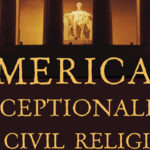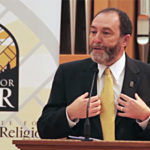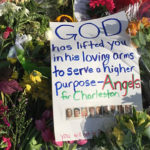Posted: 9/19/03
Gaddy warns of sacrificing freedoms
By Ken Camp
Texas Baptist Communications
OKLAHOMA CITY–Americans are scared, so fearful that they will trade freedom for security, according to a former Texas pastor who now leads the Interfaith Alliance. But truth-telling is the antidote for fear-mongering intolerance, Welton Gaddy asserted.
Gaddy, former pastor of Broadway Baptist Church in Fort Worth, addressed a “Religious Freedom Celebration,” Sept. 11 in downtown Oklahoma City, sponsored by Associated Baptist Press.
Noting the attack on the Murrah Federal Building less than a half-mile from where the meeting was held, as well as the second anniversary of the attacks on the World Trade Center and the Pentagon, Gaddy observed that Americans are gripped by fear.
“Fear transforms people's lives to the point where they are willing to give up freedom for security and sacrifice fundamental rights for a promise of safety,” said Gaddy, who also serves as pastor for preaching and worship at Northminster Baptist Church in Monroe, La.
And fear breeds intolerance, he added. “In an environment of fear, difference becomes a moral category. To be different is not to hold an alternative opinion or religion. To be different is to be wrong, to be considered a threat, even, some would say, the embodiment of evil.
“The presence of such a view of differences in a land of great diversity is a threat to democratic discourse, to interfaith cooperation and to the realization of a civil society.”
Religious bodies throughout the United States are divided by “hot button” issues such as homosexuality, the role of women and the institutional relationship between religion and government, Gaddy noted.
“These issues prove controversial and even divisive within themselves. However, when self-serving power grubbers grab these issues and wield them as wedges, tools for the advancement of their narrow agendas, these issues for discussion and debate become litmus tests for loyalty and orthodoxy that bring about separation, division and schism within one tradition after another,” he said.
In this environment, Americans must “work hard” to maintain the degree of religious freedom they have enjoyed in the past and to secure it for the future, Gaddy asserted.
“At the intersection of religion and politics, a sizable shotgun wedding has taken place between religion and politics–the politicization of religion and the religiofication of politics. … How that marriage fares will determine the shape of religious liberty in this nation in the future–if, indeed, religious liberty exists in the future.”
Noting that “when religious freedom is in trouble, both religion and freedom are in trouble,” Gaddy urged reporters of religion to tell the truth.
“Telling the truth is not easy. But the religious press must stay the course and continue the hard work of truth telling,” he said.
And telling the whole truth about religion is critical in a context where religion is at the heart of many top news stories, he added. “From politicians' manipulation of religion to promote partisan causes, to religionists' efforts to manipulate politics for sectarian gains, to terrorists' claims to be servants of the Almighty, to governmental leaders appeal to deity and morality to support their policies of war, religion is an unmistakable component of today's news.”
Gaddy urged news organizations to pay close attention to the role of religion throughout the 2004 elections.
“I hope political reporters and religion reporters across the nation will report on religion in the various campaigns with the same kind of scrutiny that will be devoted to economic policies and foreign affairs, citing not just how religious language is used by candidates, but exploring the meaning of what is said,” he asserted.
He also called on reporters to be sensitive to labels, particularly when it comes to attributing acts of terrorism to followers of a particular faith.
“Characteristically, terrorist acts by Muslims are attributed to Islamic fundamentalists, while similar acts by Christians are reported apart from any reference to religion,” Gaddy observed. “The atrocity perpetrated in this city was a terrorist act by a Christian fundamentalist that was anticipated and applauded by many in the Christian Identity movement.”














We seek to connect God’s story and God’s people around the world. To learn more about God’s story, click here.
Send comments and feedback to Eric Black, our editor. For comments to be published, please specify “letter to the editor.” Maximum length for publication is 300 words.